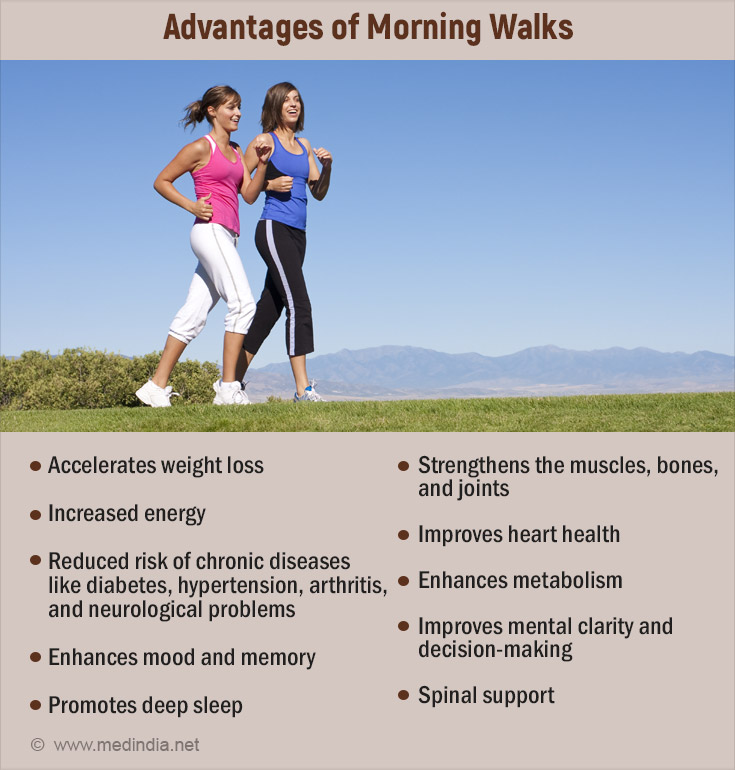- 5 surprising benefits of walking - (https://www.health.harvard.edu/staying-healthy/5-surprising-benefits-of-walking#)
- Experimental effects of brief, single bouts of walking and meditation on mood profile in young adults - (https://www.ncbi.nlm.nih.gov/pmc/articles/PMC6064756/)
- The Effectiveness of Physical Exercise on Bone Density in Osteoporotic Patients - (https://www.ncbi.nlm.nih.gov/pmc/articles/PMC6323511/)
- Your lungs and exercise - (https://www.ncbi.nlm.nih.gov/pmc/articles/PMC4818249/)
- Effects of exercise before or after meal ingestion on fat balance and postprandial metabolism in overweight men - (https://pubmed.ncbi.nlm.nih.gov/23167985/)
- The effect of a short-term physical activity after meals on gastrointestinal symptoms in individuals with functional abdominal bloating: a randomized clinical trial. Gastroenterol Hepatol Bed Bench - (https://pubmed.ncbi.nlm.nih.gov/33868611/)
- Walk to a better night of sleep: testing the relationship between physical activity and sleep - (https://www.ncbi.nlm.nih.gov/pmc/articles/PMC6801055/)
About
Walking is a natural, convenient activity that improves body posture, insulin/glucose control, and high-density lipoprotein metabolism. It is a rhythmic and dynamic aerobic activity of large skeletal muscles with few negative effects.
Did You Know?
Walking just 30 minutes a day can boost your mood, enhance creativity, and even improve your sleep quality! Plus, it's a great way to soak up some vitamin D.Importance of Walking
Walking, a healthy physical activity, originated in the 1990s. In 1995, the Centers for Disease Control and the American College of Sports Medicine recommended brisk walking at 3 to 4 mph as the primary example of moderate-intensity activity. Walking is a gentle beginning for sedentary people, including inactive, immobile older adults, promoting independence and social well-being. Walking is a basic health practice that can reduce the incidence of several chronic diseases while lowering rising healthcare expenses.
Benefits of Walking
Regular morning walks provide numerous health benefits. Morning walks can be helpful to both your body and mind. To live a healthy life, one can make several lifestyle modifications, one of which is to incorporate a morning walk into one's daily routine. It is an excellent solution for people of all ages, with no negative side effects.
Advantages of Walking
- Accelerates Weight Loss
- Increases energy
- Reduces risk of chronic diseases like diabetes, hypertension, arthritis, and neurological problems
- Enhances mood and memory
- Promotes deep sleep
- Strengthens the muscles, bones, and joints
- Improves heart health
- Enhances metabolism
- Improves mental clarity and decision-making
- Spinal support

Accelerates Weight Loss
Sedentary lifestyles are on the rise, resulting in an increase in obesity and overweight individuals. Furthermore, dietary restrictions are difficult nowadays. Taking a fast-paced walk first thing in the morning every day, regardless of what meals are consumed as part of the usual diet, aids in weight loss, particularly visceral belly fat.
The body's mechanism is activated in the morning, and calories are burned at a faster rate, which aids in weight management and maintaining a healthy body mass index (BMI), which aids in the treatment of obesity and overweight conditions. As a result, walking helps people lose weight, which makes them more fit and reduces health problems.
Improves energy levels
A lack of physical activity causes fatigue and lethargy. A brisk morning walk boosts metabolism, which is the breakdown of food components to generate energy for daily tasks at home and work. Moving the entire body for 20 to 30 minutes every morning provides adequate energy to do any tough tasks for the rest of the day.
Walking for at least 20 minutes five days a week reduces sick days by 43%(1✔ ✔Trusted Source
5 surprising benefits of walking
Go to source). If people become ill, they will notice some modest symptoms.
Daily activities will become easier to do as they gain energy and flexibility from their daily walk. It also increases concentration and productivity.
Prevents Chronic Diseases
Regular morning walks play a crucial role in preventing chronic diseases and maintaining overall health. Engaging in physical activity can alleviate joint stiffness, manage blood sugar levels, and enhance blood flow to the brain, reducing the risk of conditions like diabetes, hypertension, arthritis, and neurological disorders such as Alzheimer's and dementia. Walking strengthens the cardiovascular system, controls blood pressure, and lowers triglyceride levels, helping to prevent hypertension. It also promotes healthy weight management, which is essential for reducing obesity-related diseases, including cardiovascular and metabolic disorders.
Moreover, morning walks have been shown to benefit those with diabetes by improving blood sugar control and insulin management. Walking helps muscles utilize glucose more efficiently, burns excess body fat, and improves body mass index (BMI). For arthritis patients, regular walking can reduce pain and stiffness. Additionally, it supports brain health by maintaining cerebral blood flow, thereby lowering the risk of stroke and dementia. Morning walks also improve the symptoms of ataxia, a disorder affecting muscle activity and coordination, and help prevent conditions like atherosclerosis by enhancing blood circulation and preventing arterial blockages.
Enhances Mood and Memory
Taking an early morning stroll every day improves one's mood since it provides fresh air and a natural setting. Stress and anxiety levels improve with as little as a 10-minute walk(2✔ ✔Trusted Source
Experimental effects of brief, single bouts of walking and meditation on mood profile in young adults
Go to source). It helps people manage the challenges of the day by getting them off to a good start.
A daily morning walk promotes the creation and distribution of neurotransmitters, which are chemicals that carry signals from nerves to various organs in the body. This ensures optimal cognitive functioning, including increased intelligence, memory, and sensible cognition.
Going for a walk during the day also helps to eliminate the unpleasant sensations of depression and anxiety, thereby significantly improving mental well-being, overall energy, and optimistic thinking.
Promotes Deep Sleep
People of all ages are increasingly reporting insomnia as a result of demanding work and home schedules, personal concerns, and unhealthy, irregular eating habits. A morning walk is the most effective technique to address all sleep-related diseases, including insomnia, snoring, and sleep apnea. Regular physical activity influences the body throughout the day, appropriate rest occurs naturally at night, and uninterrupted sleep is guaranteed.
Strengthens the Muscles, Bones, and Joints
While proteins, vitamins, and minerals such as calcium, magnesium, and phosphorous are required for muscular strength and bone health, regular exercise promotes joint flexibility and provides healthy bones and muscles. An early walk tones your leg and abdominal muscles.
A 30-minute strenuous morning walk every day increases bone density(3✔ ✔Trusted Source
The Effectiveness of Physical Exercise on Bone Density in Osteoporotic Patients
Go to source), keeps joints lubricated, develops muscles, and reduces the risk of developing arthritis, osteoporosis, and other debilitating illnesses in old age. Regular morning walks decrease the osteoporosis process and help to manage blood pressure and cholesterol levels.
Enhances Heart Health
A morning walk, jogging, or running significantly benefits heart health by reducing the risk of coronary heart disease and enhancing cardiovascular function. Regular walking increases heart rate, decreases blood pressure, and improves blood circulation, which strengthens cardiac muscles and prevents hypertension, cardiac arrest, heart attacks, atherosclerosis, and arrhythmias. A vigorous 30-minute walk also enhances lung capacity(4✔ ✔Trusted Source
Your lungs and exercise
Go to source), prevents respiratory issues, and helps maintain blood pressure, making it a preferable alternative to medication with potential side effects.
Enhances Metabolism
A morning stroll followed by a cardio workout will boost body metabolism and leave you feeling active and energized for the remainder of the day(5✔ ✔Trusted Source
Effects of exercise before or after meal ingestion on fat balance and postprandial metabolism in overweight men
Go to source). Drink a glass or two of water after your walk. Water boosts metabolism, keeps the body hydrated, and eliminates pollutants.
Improves Mental Clarity and Decision-making
Starting the day with a morning walk can significantly enhance mental clarity and support better decision-making. It activates brain cells, reduces tension and anxiety, and fosters sustained attention and cognitive performance throughout the day. Morning walks also encourage the free flow of thoughts, aiding problem-solving and boosting creativity. Regular walking can make you feel more energetic and less sleep-deprived, promoting overall mental well-being and healthier daily choices.
Spine Support
Body posture will improve, and it will assist the spine to be in good posture as people are required to sit for a longer time at work, college, or school as part of their daily routine.
When is the Best Time to Go for a Walk?
Walking at different times of the day offers unique benefits, making it a versatile and valuable activity for overall health. Walking before meals is particularly beneficial for managing blood sugar and fat levels. Engaging in physical activity before eating helps the body use consumed food to replenish energy stores rather than storing it as fat. This practice can significantly reduce the accumulation of sugar and fat in the blood after meals, contributing to better metabolic health. Walking before dinner is especially advantageous as it boosts metabolism, resulting in higher calorie burn during digestion. A study highlighted that individuals who walked before eating burned more fat compared to those who walked post-meal(6✔ ✔Trusted Source
The effect of a short-term physical activity after meals on gastrointestinal symptoms in individuals with functional abdominal bloating: a randomized clinical trial. Gastroenterol Hepatol Bed Bench
Go to source).
Walking after meals also has its own set of health benefits, particularly for digestion and blood sugar regulation. Post-meal walks stimulate the digestive system, aiding in the movement of food through the digestive tract and potentially relieving bloating and discomfort(7✔ ✔Trusted Source
Walk to a better night of sleep: testing the relationship between physical activity and sleep
Go to source). Additionally, post-meal walks can enhance muscle glucose uptake, which is especially beneficial for individuals with insulin resistance or diabetes. By improving glucose metabolism and insulin sensitivity, walking after meals can contribute to better blood sugar control and reduced risk of type 2 diabetes.
Beyond metabolic benefits, walking after meals positively impacts cardiovascular health, mental well-being, and sleep quality. Regular post-meal walks promote heart health by improving circulation, lowering blood pressure, and reducing the risk of cardiovascular diseases. This low-impact exercise also encourages the release of endorphins, which help reduce stress and anxiety. Furthermore, a moderate walk after dinner can enhance sleep quality by regulating circadian rhythms and promoting relaxation, particularly benefiting those with insomnia. Overall, whether before or after meals, incorporating regular walks into your routine can lead to substantial health improvements, including better weight management, joint health, cognitive performance, and overall well-being.
Tips for a Beneficial Morning Walk
A morning walk is an excellent way to kickstart your day, offering various physical and mental health advantages. Here are some tips to enhance your morning walk routine:
- Maintain a Straight Posture: Walk with a straight back and engage your core muscles. This helps tone your abs and supports good posture.
- Walk Early: Aim to walk first thing in the morning when your energy levels are high and blood circulation is optimal. This time of day also allows you to absorb vitamin D from the early morning sun.
- Hydrate Properly: Ensure you are well-hydrated before starting your walk, but avoid drinking too much water during brisk walks to prevent respiratory issues. Carry a water bottle for longer walks to stay hydrated.
- Start Slow: If you are new to walking as exercise, begin at a comfortable pace and gradually increase your speed and duration over time to avoid overexertion.
- Avoid Walking Right After Meals: Exercising immediately after eating can disrupt digestion. It's best to wait a bit after meals before starting your walk.
- Enjoy the Sunshine: Walking in the morning sunlight helps your body produce vitamin D, which is essential for bone health and immune function.
- Burn Calories Consistently: Regular morning walks can help you burn calories and manage your weight effectively.
- Companionship: Walk with a friend or join a walking group. This can make your walks more enjoyable and help you stay committed to your routine.
By incorporating these tips into your morning walk, you can maximize the health benefits and start your day on a positive note.









